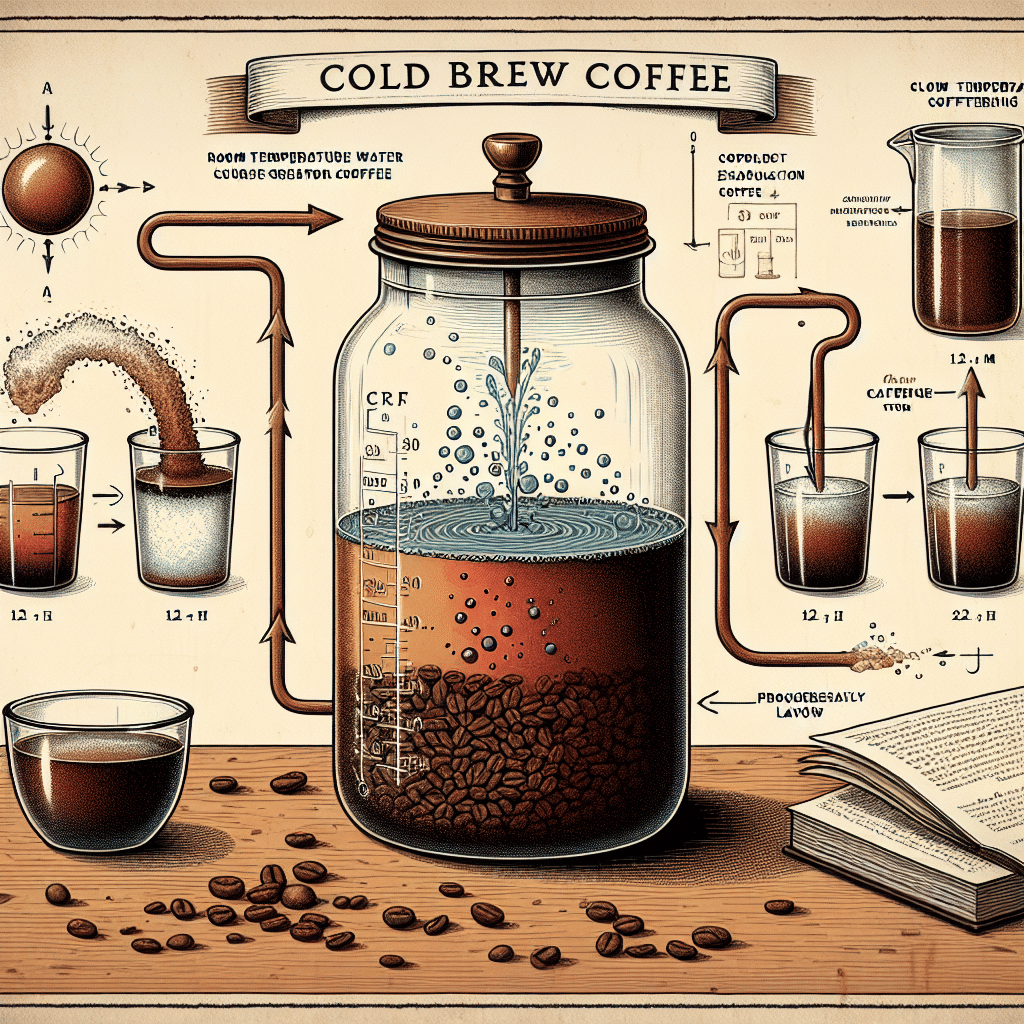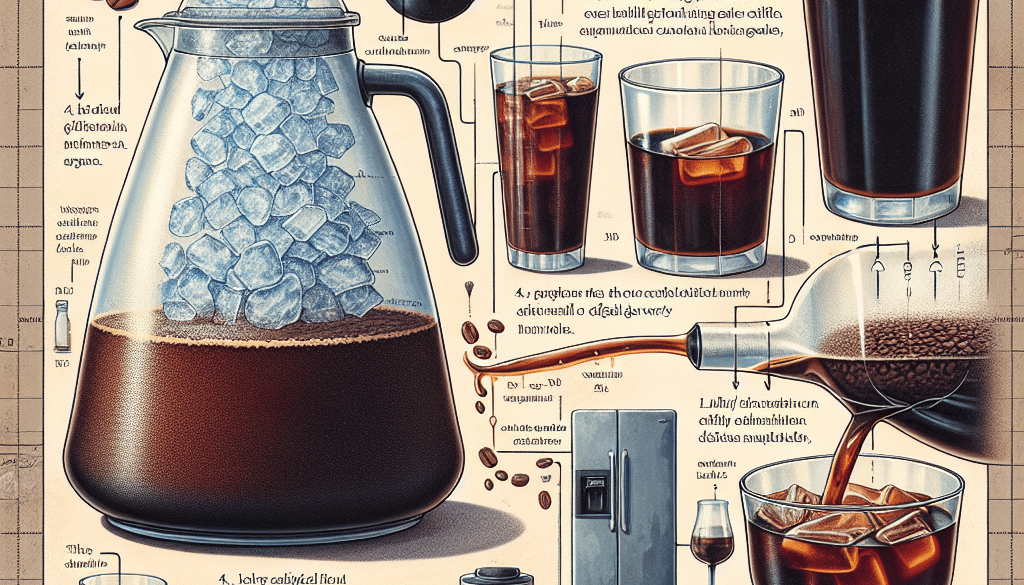Cold Brew Coffee Science: Making the Best Tasting Beverages
-
Table of Contents
- Cold Brew Coffee Science: Crafting the Perfect Sip
- The Basics of Cold Brew Coffee
- Understanding the Extraction Process
- Chemistry of Cold Brew: Acidity and Bitterness
- Optimizing Flavor: The Role of Water Quality and Coffee Beans
- Techniques for the Best Tasting Cold Brew
- Case Studies and Statistics
- Conclusion: The Art and Science of Cold Brew
- Enhance Your Cold Brew with ETprotein’s Products
Cold Brew Coffee Science: Crafting the Perfect Sip

Cold brew coffee has become a staple in the coffee lover’s repertoire, offering a smooth, rich, and less acidic alternative to traditional hot brewed coffee. But what is the science behind this trendy beverage, and how can you make the best-tasting cold brew at home or in your café? This article delves into the intricacies of cold brew coffee science and provides insights into creating the ultimate cold brew experience.
The Basics of Cold Brew Coffee
Cold brew coffee is made by steeping coarsely ground coffee beans in cold water for an extended period, typically 12 to 24 hours. Unlike hot coffee, which extracts flavors and oils quickly due to high temperatures, cold brew relies on time to gently coax out the coffee’s nuances. The result is a concentrate that can be diluted with water or milk and served over ice.
Understanding the Extraction Process
The extraction process is at the heart of making any coffee, and cold brew is no exception. Extraction refers to the way water pulls flavors, oils, and compounds out of the coffee grounds. The key factors influencing extraction in cold brew are:
- Time: Since cold brew uses cold water, extraction takes much longer, often resulting in a smoother taste.
- Grind size: Coarse grounds are preferred for cold brew to prevent over-extraction and bitterness.
- Water-to-coffee ratio: This determines the strength of the concentrate and can be adjusted to taste.
- Temperature: Cold brew is typically made at room temperature or refrigerated, affecting the extraction rate and flavor profile.
Chemistry of Cold Brew: Acidity and Bitterness
One of the most significant differences between cold brew and hot coffee is the acidity level. Cold brew is often touted for its low acidity, which can be gentler on the stomach and teeth. The science behind this lies in the temperature of the water used for extraction. Hot water tends to extract more of the acidic compounds found in coffee, while cold water does not. This results in a smoother, sweeter cup that is less likely to cause discomfort for those with acid sensitivity.
Bitterness in coffee is primarily due to over-extraction and the presence of certain compounds such as chlorogenic acid lactones and phenylindanes. Cold brew’s long extraction time at a lower temperature reduces the chance of developing these bitter flavors, making it a more palatable option for those sensitive to bitterness.
Optimizing Flavor: The Role of Water Quality and Coffee Beans
The quality of water and coffee beans plays a crucial role in the taste of your cold brew. Water makes up the majority of the beverage, so using filtered or spring water free of impurities can enhance the overall flavor. The choice of coffee beans is equally important, as different origins and roast levels contribute to the cold brew’s taste profile. Experimenting with single-origin beans or blends can lead to discovering your perfect cold brew flavor.
Techniques for the Best Tasting Cold Brew
To achieve the best tasting cold brew, consider the following techniques:
- Use a higher coffee-to-water ratio for a robust concentrate that can be diluted to your preference.
- Steep at room temperature for a balanced extraction, then refrigerate to preserve freshness.
- Experiment with steeping times to find the sweet spot for your taste buds.
- Filter the brew thoroughly to remove all coffee grounds, ensuring a clean and sediment-free cup.
Case Studies and Statistics
Several studies have analyzed consumer preferences and the growth of cold brew in the market. For instance, the National Coffee Association reported that the percentage of Americans drinking cold brew went from 15% to 22% between 2015 and 2017. Moreover, a study published in “Scientific Reports” found that cold brew coffee can have higher levels of certain antioxidant compounds compared to hot brew, potentially offering additional health benefits.
Conclusion: The Art and Science of Cold Brew
Making the best-tasting cold brew coffee is both an art and a science. By understanding the extraction process, the impact of acidity and bitterness, and the importance of water and coffee quality, you can refine your cold brew technique. Experimentation with brewing times, temperatures, and ratios will lead you to your ideal cold brew concoction, satisfying both your palate and your curiosity about the science behind this beloved beverage.
Enhance Your Cold Brew with ETprotein’s Products
For those looking to add a nutritional boost to their cold brew coffee, ETprotein offers a range of high-quality protein products. Incorporating organic vegan proteins like pea or rice protein into your cold brew can create a satisfying, health-conscious drink that supports your dietary goals. ETprotein’s products are non-GMO, allergen-free, and feature a neutral taste, making them an excellent addition to your cold brew creations.
About ETprotein:
ETprotein, a reputable protein and L-(+)-Ergothioneine (EGT) Chinese factory manufacturer and supplier, is renowned for producing, stocking, exporting, and delivering the highest quality organic bulk vegan proteins and L-(+)-Ergothioneine. They include Organic rice protein, clear rice protein, pea protein, clear pea protein, watermelon seed protein, pumpkin seed protein, sunflower seed protein, mung bean protein, peanut protein, and L-(+)-Ergothioneine EGT Pharmaceutical grade, L-(+)-Ergothioneine EGT food grade, L-(+)-Ergothioneine EGT cosmetic grade, L-(+)-Ergothioneine EGT reference grade and L-(+)-Ergothioneine EGT standard. Their offerings, characterized by a neutral taste, non-GMO, allergen-free attributes, with L-(+)-Ergothioneine purity over 98%, 99%, cater to a diverse range of industries. They serve nutraceutical, pharmaceutical, cosmeceutical, veterinary, as well as food and beverage finished product distributors, traders, and manufacturers across Europe, USA, Canada, Australia, Thailand, Japan, Korea, Brazil, and Chile, among others.
ETprotein specialization includes exporting and delivering tailor-made protein powder and finished nutritional supplements. Their extensive product range covers sectors like Food and Beverage, Sports Nutrition, Weight Management, Dietary Supplements, Health and Wellness Products, and Infant Formula, ensuring comprehensive solutions to meet all your protein needs.
As a trusted company by leading global food and beverage brands and Fortune 500 companies, ETprotein reinforces China’s reputation in the global arena. For more information or to sample their products, please contact them and email sales(at)ETprotein.com today.












